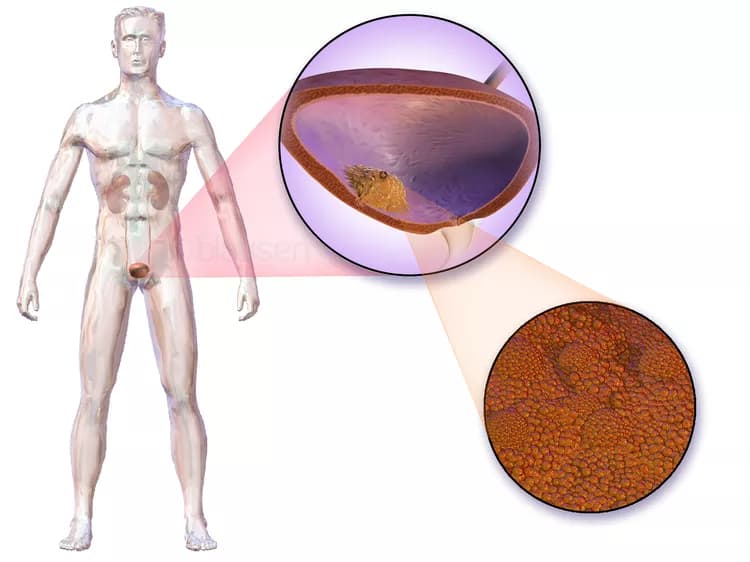
Genes That Hold The Clues To Bladder Cancer And Its Treatment
Scientists have discovered the 'genetic signatures' of the most common form of bladder cancer -- and it could open up the possibility of better-targeted treatment, according to research published today (13 November).
The study looked at non-invasive bladder cancer tumours which form in the lining of the bladder and have not spread to the bladder muscle.
According to the NHS, there are 10,000 new cases of bladder cancer diagnosed in the UK every year, more than half of which are non-invasive.
The researchers from the University of Leeds, who were funded by Yorkshire Cancer Research, found that there are two genetic variants or subtypes of these tumours.
At the moment, all patients with non-invasive bladder cancer are treated similarly but scientists believe by understanding the genetic mutations involved in each of the subtypes, more targeted therapies can be offered.
Lead investigator Professor Margaret Knowles, from the Leeds Institute of Cancer and Pathology, said: "We have already identified a vulnerability in the cancer cells of one of the genetic subtypes. Our aim is to see if we can develop an experimental compound that could exploit this vulnerability, with the eventual aim of developing a drug that would kill the cancer cells.
"Although these tumours are not usually life-threatening, they frequently recur and patients require long-term invasive monitoring and repeated surgery.
"Our improved ability to identify these specific molecular features of individual tumours should allow a more personalised approach to therapy and disease management in future."
The research found that many of the genetic mutations in these tumours disrupt so-called tumour suppressor genes, which normally act to prevent cancers.
The genetic flaws that contribute to the development of the tumours are not inherited but accumulate throughout life, largely through exposure to environmental factors, including cigarette smoking.
Dr Kathryn Scott, Chief Executive at Yorkshire Cancer Research, commenting on the research findings, said: "This is a fantastic discovery that could change the way we treat bladder cancer. Personalised treatment is a particularly exciting area of cancer research.
"If we can understand the exact genetic make-up of a tumour, we can give patients specific treatments that could have a greater chance of success. By tailoring therapies to a patient's personal needs, we can avoid prescribing unnecessary treatment that can severely affect their quality of life."
Some gene mutations linked to gender
The study, published in the journal Cancer Cell, also found that women were more likely to have a defect on a specific tumour suppressor gene. Three-quarters of the tumour samples from women, 20 out of 27, had the defect -- compared to 42 per cent of the samples from men (23 out of 55).
Professor Knowles says further research is needed to see why women are more likely to have this genetic fault, to discover whether they are more likely to be exposed to a particular cancer-causing agent or whether it relates to differences in the biology of male and female bladders.
This is one of the first studies to look at the genetics of early-stage bladder cancer. Most research focuses on aggressive bladder cancers but a lot of urology practice involves treating and monitoring people with non-invasive bladder cancer.
Materials provided by University of Leeds. Note: Content may be edited for style and length.
Disclaimer: DoveMed is not responsible for the accuracy of the adapted version of news releases posted to DoveMed by contributing universities and institutions.
References:
Carolyn D. Hurst, Olivia Alder, Fiona M. Platt, Alastair Droop, Lucy F. Stead, Julie E. Burns, George J. Burghel, Sunjay Jain, Leszek J. Klimczak, Helen Lindsay, Jo-An Roulson, Claire F. Taylor, Helene Thygesen, Angus J. Cameron, Anne J. Ridley, Helen R. Mott, Dmitry A. Gordenin, Margaret A. Knowles. (2017). Genomic Subtypes of Non-invasive Bladder Cancer with Distinct Metabolic Profile and Female Gender Bias in KDM6A Mutation Frequency. Cancer Cell. DOI: 10.1016/j.ccell.2017.08.005
Related Articles
Test Your Knowledge
Asked by users
Related Centers
Related Specialties
Related Physicians
Related Procedures
Related Resources
Join DoveHubs
and connect with fellow professionals

0 Comments
Please log in to post a comment.